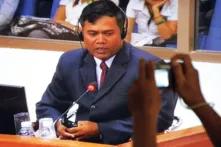
Sometimes when Cambodians are unable to express themselves, they might say they are dam-douem-kor (planting a kapok tree); if they are depressed, they will often use the phrase thelea-tdeuk-ceut (the water in my heart has fallen); and if they are feeling anxious, they may describe it as khyal goeu (wind overload, to explain their shortness of breath).
Michael Hirsch, a visiting assistant professor to the Royal University of Phnom Penh’s psychology department, said there were very few direct translations of psychological terms from English to Khmer.
This often resulted in Cambodians using “idioms of distress”, which tended to involve description of a physical concept rather than a one-word English term.
“[A word] like ‘water’ in English is tdeuk in Khmer, that’s a one-to-one correspondence … but domestic violence or rape, those terms don’t have a one-to-one correspondence, so when Khmer people translate those words, they have to use more than one word to capture what is being said,” Hirsch said.
The problem was that there were no agreed and consistent translations, which made things difficult when different services tried to work together, said Hirsch.
A lack of accurate translation has been particularly problematic during the trials at the ECCC, he said.
“It doesn’t make for smooth legal cases, and it doesn’t make for bringing the healing that the nation desperately needed from that particular body of trials and evidence,” Hirsch said.
In an attempt to standardise Khmer psychosocial terminology, the Royal University of Phnom Penh’s psychology and social work departments are teaming up to create the first comprehensive English-Khmer psychosocial dictionary.
Hirsch said previous attempts at creating a kind of glossary had rarely reached more than 30 to 40 words.
Currently, the RUPP’s dictionary – still just a document file on a computer – has 2,500 words ready for translation, with the number likely to exceed 3,000, and the initial selection of words set to be completed by the end of 2015.
To ensure the definition of each word is as clear as possible, Hirsch and his team have been sifting through psychological texts, NGO documents and academic journals that have used Khmer terms.
They then add what they find to an inventory that lists how and where the different terms have been used; it’s a very time-consuming process, and they have found some terms require a lot of explanation.
“[Some need] more than just a term, they actually require a few sentences of explanation, and some terms even require some examples of how you would use it in practice or a counselling session.”
Transcultural Psychosocial Organization (TPO) executive director Chhim Sotheara was an expert witness in Case 002 at the ECCC, and said that an English-Khmer dictionary for psychosocial terms would have been useful during the trials.
“At the ECCC, [the translator] doesn’t even understand what psychiatry and psychology are, so they translate it as one [word],” he said.
“For example, I say I’m a psychiatrist, and they would say I am an expert in psychology.”
Another example from the court saw schizophrenia translated as psychosis, because there is no word for schizophrenia in the Khmer language.
Cambodians who have been diagnosed with schizophrenia will often say they feel they have a “crazy mind” to describe their symptoms.
Schizophrenia is such a unique condition that Sotheara said he has seen Cambodian health professionals simply use the word schizophrenia, because it is difficult to find an equivalent in Khmer.
One of the most mentioned mental health disorders mentioned in the courts was post-traumatic stress disorder (PTSD).
A common mental health disorder in Cambodia following the Khmer Rouge regime, PTSD has no direct translation in Khmer, but is most commonly translated as baksbat, meaning “broken courage”.
Sotheara studied the relationship between PTSD and baksbat and found the Khmer term to be insufficient.
“Professional mental health [workers] say broken courage is PTSD … but we have much more meaning than that in PTSD. Personally I don’t accept the term.”
In his research, Sotheara found there are different kinds of baksbat, with the clinical condition of baksbat (PTSD) being more serious than its use in everyday Khmer language.
When Sotheara’s patients come in for counselling sessions, rather than saying they are depressed they use such expressions as “I am thinking a lot” or “I’m feeling difficulty in the mind”.
“They never come and say ‘I’m anxious, I’m depressed’, because those words are not used widely by the public,” he said.
Inconsistent translations when counselling could make health professionals’ work difficult, said Sotheara, and an English-Khmer psychosocial dictionary would benefit the translation process.
“For me, there are some difficulties [between] the English and the translation.
I think to be able to understand, to have a kind of consistency, people from different fields should work together on developing [standardised terms].”
Sotheara said eventually the dictionary may help to bring the English names for common mental health disorders such as depression and anxiety, which are difficult for Cambodians to explain, into the Khmer vernacular.
Author, Louisa Wright. Retrieved from http://m.phnompenhpost.com/post-weekend/finding-right-words-translate-trauma
